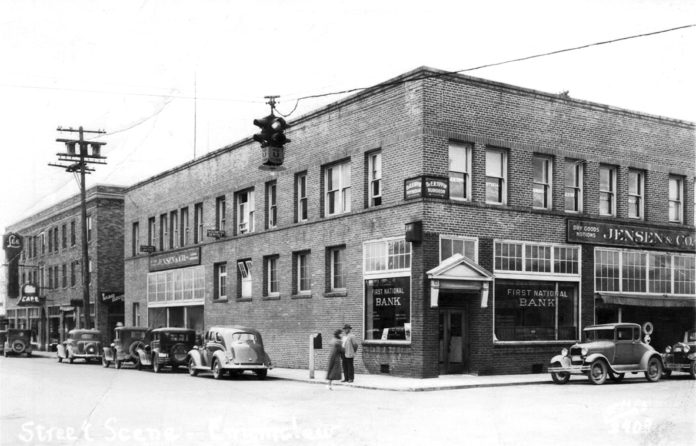The heart of Enumclaw is located at the intersection of Griffin Ave. and Cole Street. The four stately buildings that occupy the corners were constructed in 1901, 1915, 1923, and 1941. This photo of the intersection’s southeast corner was taken before 1939, as the postcard on which it appeared was mailed that year. This intersection not only featured Enumclaw’s first traffic light, but over the years banks have operated on three of its four corners. The venerable Lee Hotel and Cafe can be seen to the left.
At the time, First National Bank of Enumclaw occupied a portion of the Jensen building. The Jensen family arrived from Denmark in the 1890s, and Paul Jensen opened a retail store dealing in women’s wear, clothing, and dry goods. This Jensen building was erected in 1915 and for 76 years, from 1899 to 1974 the Jensen family operated their store. Second-story offices were rented to doctors, dentists, and attorneys. Jensen Street in Enumclaw is named in honor of Paul and his brother, J. Charles Jensen.
First National was Enumclaw’s first bank formed in 1904 and originally known as the State Bank of Enumclaw. Its founders were the town’s leading citizens including A.W. and Archie Stone, Dr. J.J. Smith, Sam Lafromboise, plus Alex and Frank Hanson of the White River Lumber Company. J.J. Smith’s son, Rufus Smith later headed the bank and in 1976 was interviewed for the Washington Rural Heritage program. He told the story of how Sam Lafromboise, owner of the local saloon allowed customers to hold their money in his saloon’s safe in envelopes identified by each person’s name. State Bank prosperously grew and by 1910 a rival named People’s State Bank was established by Byron Kibler, J.W. Davis, S.L. Sorensen, and Chris Borgaard.
State Bank, later First National was first located at the northwest corner of Cole and Washington where Douglas Plumbing later operated. Their second location was on the east side of Cole Street several doors south from this site. In 1922, the firm was renamed First National Bank of Enumclaw and moved into the Jensen Building. That same year People’s became Enumclaw National Bank and the following year built a new building kitty-corner from this one. During the dark days of the Great Depression, People’s bank failed and First National purchased its assets agreeing to assume their rival’s deposits, albeit at a 20% discount. Nonetheless, Enumclaw’s citizens retrieved 80% of their savings when other bank failures spelled ruin in the days before deposit insurance.
First National Bank constructed its own building in 1941 at this same intersection directly across Griffin Ave. from this site. Across the street its one-time rival’s name, “Enumclaw National Bank” is chiseled into the top of its façade. First National remained at Griffin and Cole until 1972 when their new building at Cole and Monroe was constructed of concrete in an architectural style fittingly referred to as Brutalist. First National Bank of Enumclaw was eventually swallowed up by Puget Sound National and finally Key Bank, which it remains today.
After the bank moved in 1941, the commercial space in this photo was taken over by Sunrise Pharmacy operated by Joe Anderson and Al Palmquist, both Enumclaw boys, and graduates of the School of Pharmacy at the University of Washington. After Sunrise closed, the space was converted to a restaurant where Europa, Café Panini, and Jackson’s later operated. Jackson’s has been closed since the Covid pandemic hit. This image #3403 by J. Boyd Ellis comes courtesy of JoAnne Matsumura, an Issaquah historian and photo collector.







